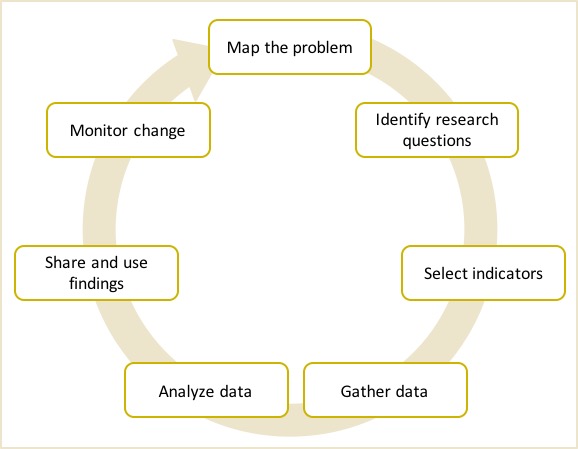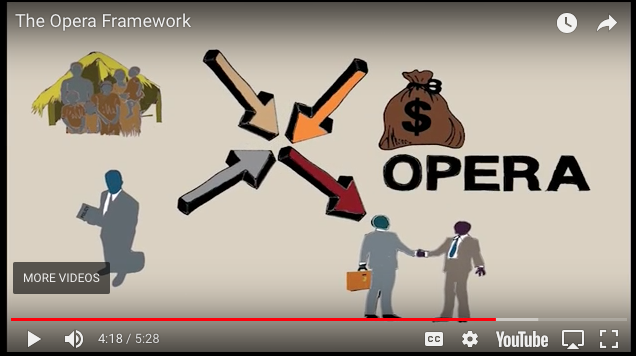Several initiatives have sought to incorporate quantitative (numbers-based) approaches into human rights research. While these have shown particular strengths in measuring specific dimensions of economic and social rights fulfillment, to present a compelling picture of whether or not a government is meeting its obligations overall, a more holistic, mixed-methods approach is needed. OPERA helps facilitate such an approach, as illustrated in this detailed graphic. It incorporates different measurement tools for specific human rights principles and standards (in bold below).
The Four Dimensions of OPERA
OPERA in the research process

 OPERA is a flexible and adaptable framework. It sets out broad categories of issues—categorized according to the four dimensions described above. Within each dimension, it also identifies indicative questions and potential methods for answering them. Importantly, however, it is up to each user to determine which of those questions demand greater attention and how they can best be answered, depending on the objectives, priorities, and practical constraints in their particular context.
OPERA is a flexible and adaptable framework. It sets out broad categories of issues—categorized according to the four dimensions described above. Within each dimension, it also identifies indicative questions and potential methods for answering them. Importantly, however, it is up to each user to determine which of those questions demand greater attention and how they can best be answered, depending on the objectives, priorities, and practical constraints in their particular context.
OPERA can therefore guide researchers in designing more detailed metrics for measuring specific issues. There are several stages in the research process (as broadly outlined in the diagram at right). OPERA can be helpful, in different ways, at each stage, e.g., organizing a problem map, categorizing indicators, structuring reports and other research outputs.
Tools and techniques for measuring the four dimensions of OPERA
To answer the questions that OPERA poses, a range of methods can be used. However, quantification—specifically, analysis making use of indicators, benchmarks, and data—is at the heart of many of the tools and techniques we have employed with it.
The advantage of using indicators (which are essentially a particular way of expressing a research question) is that they help identify standardized, comparable units of measurement that can be analyzed in various ways, in order to show patterns and trends. Our resources on OPERA also provide guidance on how to gather data on indicators, including from secondary sources (e.g. socioeconomic statistics, administrative records, budgetary data) and primary sources (e.g. community audits, surveys).
However, data needs interpretation. A number itself is just a number. Data needs to be compared against benchmarks. Different kinds of comparisons will be appropriate in difference contexts and the strategic questions associated with benchmarking are an increasing focus for us in applying OPERA.
While quantification can be a valuable approach to researching large-scale and systematic issues, OPERA also recognizes the need to balance quantitative and qualitative analysis, as well as the importance of personal testimonies.
CESR Publications Related to OPERA
The OPERA Framework is CESR’s foundational publication on OPERA. It lays out, in detail, the relevant human rights and standards to be measured when monitoring the fulfillment of economic and social rights, the rationale for developing OPERA, how it builds on existing measurement initiatives, and the tools and techniques might be employed for assessing each of its four steps.
Defending Dignity is a training manual on monitoring development policies through the lens of economic and social rights that we co-produced with the Asia Pacific Forum of National Human Rights Institutions in 2015. The manual takes readers through OPERA and the tools and techniques for gathering and analyzing quantitative and qualitative data, including a particular focus on budgetary data. It also considers specifically how national human rights institutions can use these tools and techniques to fulfil their mandated functions.
CESR’s briefing, Assessing Austerity, considers how OPERA could be adapted as a potential methodology for conducting a human rights impact assessment of fiscal consolidation measures. It demonstrates why assessing austerity is both necessary and feasible and how it can contribute to advancing alternative policies that would prevent harmful forms of fiscal consolidation in the future, including tackling tax abuse, strengthening tax authorities, debt renegotiation and reallocation of unnecessary expenditures.
The OPERA Framework Video
This brief video explains how OPERA employs different measures for specific human rights principles and standards to trace economic and social deprivations and disparities back to the actions or omissions of the state.
